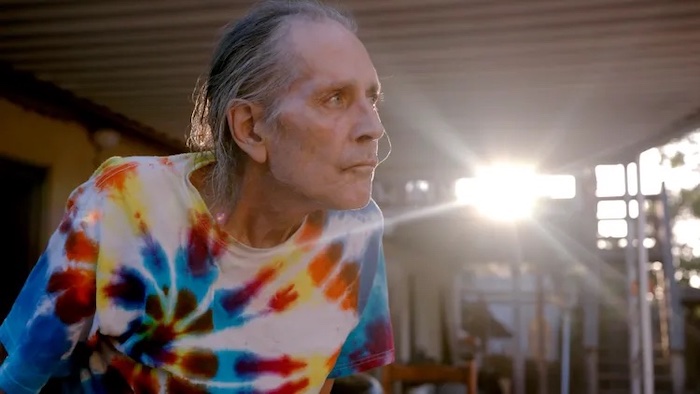
Here’s a documentary that develops its thesis on several levels of lowered expectations, as if the director, Jed I. Rosenberg, felt he had to hedge his bets owing to the central focus of attention, Gary Young, the first drummer for the indie rock band Pavement who only played on their early singles and first album before being dropped for reasons that the band’s followers know by heart but which Rosenberg and his team of fanboy filmmakers believe will be of interest to a wider cross-section of music lovers. That’s debatable, though in the end I found that the almost obsessive attention afforded Young and his story helped me appreciate Pavement’s singular achievements in a new way. In retrospect, and even while they were extant, the group has been hailed as the seminal indie band of the 90s, and this movie drives home that point, albeit a bit tangentially.
Young, who was almost 20 years older than anyone else in Pavement, is introduced as he was at the time the doc was made (he has since died): a slurring alcoholic who takes oodles of medication to regulate his shaky physical plant. A quick summary of his musical background ensues, illustrated with well-executed recreations of anecdotes using puppets, which includes stints as a drummer in various hard rock bands that served as the recreation of choice by transgressive types in the 1980s Central Valley blighted suburb of Stockton, California. He managed to transpose his slight reputation for creative integrity to a homemade recording studio called Louder Than You Think, which proved to be the only game in town for the budding punk outfits who thought they could break out of there. Stephen Malkmus and Scott Kannberg, who called themselves Pavement (Kannberg had studied urban planning in Arizona), solicited Young’s help in recording some songs and when those songs proved exciting to the ‘zine and college radio crowd, they enlisted Young as their drummer for concerts, which sealed their reputation as the next big thing after Spin magazine—a “real” music publication—gave a glowing review of the demos for their as-yet unreleased debut album that Young engineered and produced. Malkmus and Kannberg were cautious and canny about their career prospects, but Young was, to paraphrase a pop credo, prepared to rock and lent their live shows a visceral component that went beyond his prog fills and aggressive time-keeping and into the realm of theater. Rosenberg provides plenty of shot-on-the-fly video to bolster Young’s reputation as a booze-fueled wild man whose on-stage antics contradicted the rest of the band’s image as slacker savants. However, the rep always endeared him to fans who eventually supported a short-lived post-Pavement indie rock career (which he also destroyed by dint of his own uncontrollable urges), including a stint as an advice columnist for none other than Japan’s own Rockin’ On magazine.
Both Malkmus (via Zoom) and Kannberg, as well as all the subsequent members of Pavement except Steve West, the drummer that replaced Young, profess their love for Gary as well as their frustration that, as great a drummer as he was, he didn’t fit in with the band’s artistic outlook. In fact, the move that got him canned was his attempt to get Columbia Records to sign the band against their wishes. Though it may sound pious to say that Pavement really tried to maintain the 90s indie ideal of defying the music establishment, their principled decisions turned out to be wise in the long run and even remunerative. In any case, those principles also held that they wouldn’t betray a friend, even one who attempted to betray them, and Young continued to receive substantial income from the band until he died, according to Gerri Young, who had been with Gary since they were sweethearts in high school in upstate New York. Though Gary Young never fully “got” Pavement and bristled at the lo-fi label they engendered (“Why would I make it sound shitty on purpose?”), he was always grateful that they supported his right to drink himself to oblivion and be the outsized Spinal Tap-like caricature he wanted to be, and in that regard this is a fitting testament.
Now playing in Tokyo at Theater Image Forum Aoyama (03-5766-0114).
Louder Than You Think home page in Japanese
